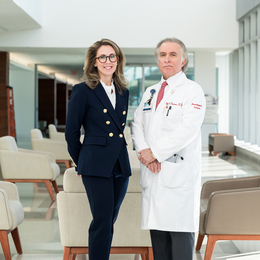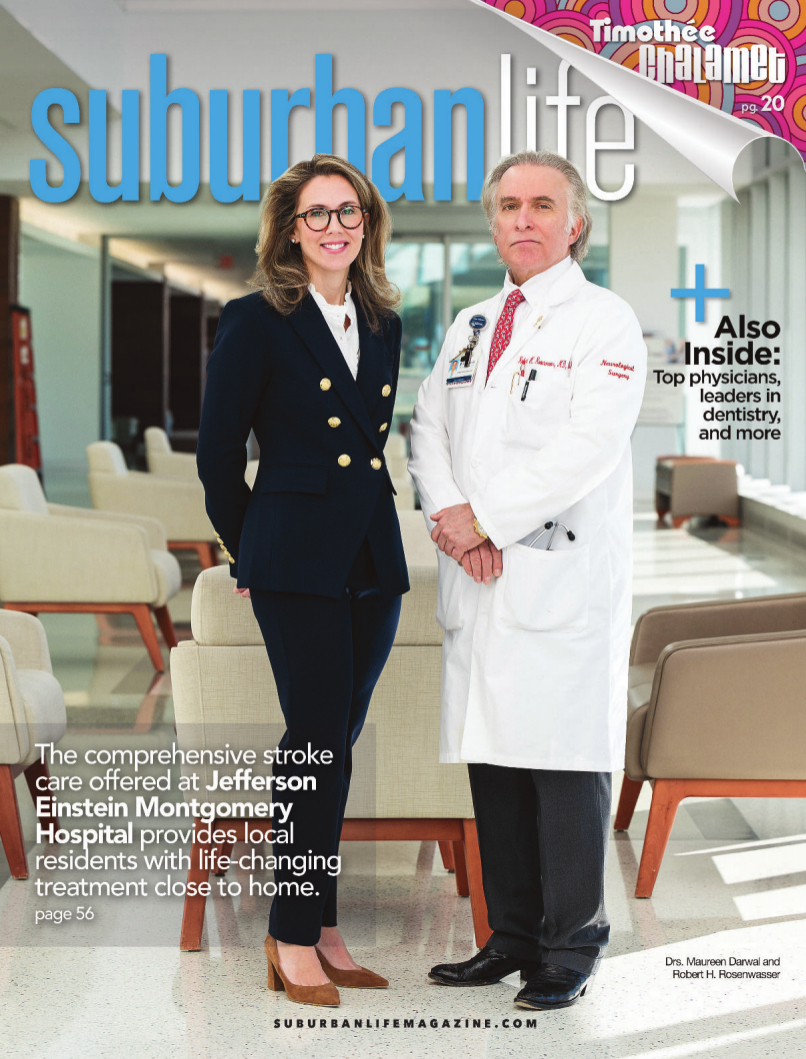
Taking Care of Their Own
The comprehensive stroke care offered at Jefferson Einstein Montgomery Hospital provides local residents with life-changing treatment close to home.
In recent years, Jefferson Health has amplified its ability to deliver world-class care to suburban residents in their own communities. This commitment has been especially beneficial for patients in need of stroke care; the phrase “time is brain” emphasizes how critically important it is to seek medical attention right away when symptoms arise.
Residents of Central Montgomery County, for example, have come to rely on the Vickie and Jack Farber Institute for Neuroscience at Jefferson Einstein Montgomery Hospital. The East Norriton campus treats the most strokes in that region, including complex cases, thanks to a team of clinicians who possess the specialized expertise needed to provide comprehensive stroke care.
“Stroke is a time-sensitive and critical disease that needs to be taken care of immediately,” says Robert H. Rosenwasser, M.D., MBA, chair of the Department of Neurological Surgery at Jefferson Health. “This type of care, including not only the intravenous administration of clot-busting drugs but also interventional management involving clot retrieval, should be regionalized. This region of the Philadelphia suburbs needs a comprehensive center, and this is strategically why we are placing this center in Jefferson Einstein Montgomery to service all the patients in that geographic region.”
The ability to treat strokes close to a patient’s home has advantages not only in emergency situations but also during the recovery process, according to Maureen Darwal, D.O., a neurosurgeon at Jefferson Health.
“Patients lose 1.9 million neurons per minute in an untreated stroke, so being able to service the community quickly brings life-changing results,” Dr. Darwal says. “Also, being able to provide stroke care close to home allows patients’ loved ones to be close to these patients while they’re recovering, and family support during a stroke recovery is immeasurably important. … If they’re able to see family every day, it reenergizes them, it brings a smile to their face, and there’s more positivity.”
Jefferson Einstein Montgomery Hospital is already certified as a Mechanical Thrombectomy-Capable Stroke Center, meaning it offers that minimally invasive procedure to remove blood clots as well as other advanced treatments, and that it adheres to rigorous standards established by The Joint Commission, a nonprofit organization that sets standards and accredits healthcare organizations across the United States. The hospital also takes additional steps to ensure that stroke patients have access to the latest treatment methods and technological advancements.
“There are certain qualifications that need to be done in terms of 24/7 stroke coverage and the ability of physicians who perform these procedures to be available,” Dr. Rosenwasser says. “One thing we are doing at Jefferson Einstein Montgomery is pursuing a comprehensive designation with the establishment of a dedicated neurosurgical intensive care unit with 24/7 neurocritical care and additional staff. This center is part of a large comprehensive network of Jefferson Health across the region in three states.”
Some of the medical comorbidities common with stroke patients include blood-clotting disorders, atrial fibrillation, hypertension, and diabetes, though Dr. Darwal says there is no set age for a stroke to occur; she has even treated patients in their 20s. The key is for the public to know the warning signs.
“Being able to educate the community about the signs and symptoms of stroke is the first step in actually having great outcomes,” she says. “Once the symptoms are observed the patient should be brought to the emergency room so they can start undergoing a stroke workup. The acronym we like to use is BE-FAST.”
The B stands for balance, which refers to a sudden loss in balance or coordination. The E stands for eyesight changes, such as blurred vision, double vision, or a gaze to one side. The F refers to the face—specifically, any type of facial asymmetry or facial numbness. The A stands for arm, referring to weakness or numbness of the arms or legs on one side of the body. The S stands for speech, as in slurred speech or difficulty speaking. Finally, the T stands for time, underscoring the need to call 9-1-1 immediately if any of these symptoms occur.
Jefferson Einstein Montgomery Hospital utilizes a collaborative approach to stroke care that starts with highly trained physicians in the emergency department. Intensive care neurologists, cardiologists, and hematology teams strive to provide the best postoperative care and give insight into the cause so that future strokes can be avoided. A partnership with Jefferson Moss-Magee Rehabilitation gives patients access to intense neuro rehabilitation and services such as occupational, physical, and speech therapy.
“I’ve been at a number of different hospitals through training and fellowship and the different places that I’ve worked, and [Jefferson Einstein Montgomery Hospital] is a very special place,” Dr. Darwal adds. “It has the feeling of a very positive, uplifting, collegial environment. From the chief operating officer down, the culture is community first and people are really there for other people.
“There’s such a deep care for our community, and I think that’s why you see such great outcomes and patient experiences when you’re there,” she continues. “That’s why I’m drawn to Montgomery and why I have a drive to make it a great neuroscience center. The people there are motivated by helping the community, and we’ve grown by leaps and bounds in the last six months.”
Being able to deliver life-saving treatment is exactly what drew Drs. Rosenwasser and Darwal to the specialty of stroke care in the first place.
“I was attracted to neuroscience early in my medical school career, and I was attracted to critical care medicine and some of the most vulnerable patients,” Dr. Rosenwasser says. “The ability to [treat] the patient who has had a stroke and restore them to functional capacity is extremely rewarding for the patient, the family, and the entire care team. To make a difference in someone’s life is a very special responsibility.”
“I think I’m a very empathetic person, and I love to help people in all ways,” Dr. Darwal adds. “In medical school I was able to see how transformative and life-saving endovascular neurosurgery procedures could be for patients, and in seeing that I realized it was my true calling in life.”
Dr. Darwal gets immense satisfaction from working with patients. She describes her work not only as a job but as a true passion.
“There’s no greater gift that I can be given than seeing a patient who has weakness or an inability to speak and being able to restore that function with the Montgomery team,” she adds. “It’s hard to describe how much satisfaction I get from taking care of these people, especially at this hospital with a group of people who really care.”
Jefferson Einstein Montgomery Hospital
559 W. Germantown Pike
East Norriton, PA 19403
(484) 622-1000
JeffersonHealth.org/EinsteinMontgomery
559 W. Germantown Pike
East Norriton, PA 19403
(484) 622-1000
JeffersonHealth.org/EinsteinMontgomery
Photo by Jeff Anderson
Published (and copyrighted) in Suburban Life magazine, February 2025.
Published (and copyrighted) in Suburban Life magazine, February 2025.



